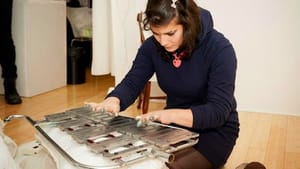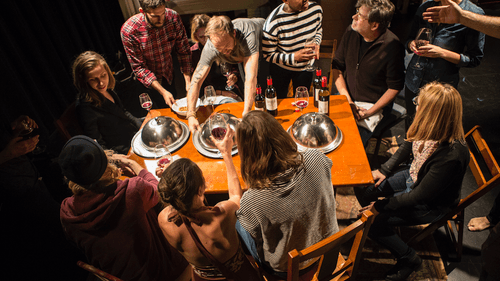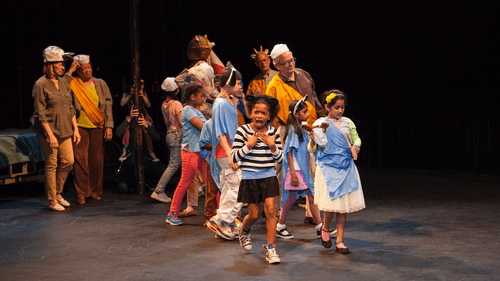Stay in the Loop
BSR publishes on a weekly schedule, with an email newsletter every Wednesday and Thursday morning. There’s no paywall, and subscribing is always free.
Art attacks
Five times the 2017 Philly Fringe Festival made me uncomfortable

This year, a few people came to Fringe shows with me who had never attended the festival before. They were a little bewildered by performances without stage or chairs, by having to remove their shoes, or by spotting glimpses of genitalia.
But honestly, after more than 10 years, the festival can still make me uncomfortable. Like when Pope Francis, in a silver-sequined minidress and stilettos, shot out of a children’s slide right in front of me during Gunnar Montana’s KINK HAÜS. It was a great look for the Bishop of Rome — it just scared me to death for a second.
I liked a lot of the work I saw this year, but much of it put me on edge — and I don’t mean in that art-afflicting-the-comfortable way.
Glockabelle
When the opening act for the September 19 Martha Graham Cracker Cabaret at FringeArts took the stage, I couldn’t figure out what was happening. It was Glockabelle’s Philadelphia debut. To imagine this French-American artist’s music live at close range, think of a deafening techno beat overlaid with your little brother’s 1986 SEGA on full blast and your parents’ landline ringer at high volume. Add to that reverb-laden squeals from Glockabelle herself (Annabelle Cazes) rising occasionally over the noise.
She rocks a pair of Casio VL-1 keyboards over the beats, and alternates by breaking out her glockenspiel with thimbles on eight fingers (a blessed relief and proof of her excellent musicianship).
The internationally touring musician remarked that she usually plays for people on their feet. Many in the FringeArts crowd covered their ears, with the grimly resigned yet uncomprehending expressions I imagine on animals in cruel experiments on learned helplessness.
“Not another one,” several people in my hearing moaned each time Glockabelle announced the next song.
The A.V. Club admiringly calls it “spasmodic pop” and “the spawn of some Ritalin-addled pop culture collision” and generally indicates that Glockabelle’s a hot ticket. Which makes me uncomfortable again, because now I’m officially, tragically unhip.
‘HOME’ in the suburbs?
I loved Geoff Sobelle’s HOME, but later on, I debated with a Fringe-loving friend whether the house onstage is in the suburbs or the city. She said "city," because the ensemble was racially diverse and the staging kept people constantly entering the scene — just like a party at your friend’s place around the block where people come and go all night.

To me, the sound design suggested otherwise: a nighttime soundtrack of chirping insects and faraway dog barks conjured a peaceful, dewy evening in the ‘burbs. At one point, a youngster escapes out the window with a knotted sheet and a pair of friendly police officers, walking in like guests at the ongoing party, bring him back. It looked like actors leaving through the kitchen’s screen door with their tennis racquets, surfboard, or potluck dishes were getting into cars instead of walking, biking, or catching the subway.
What does my rowhome in the city sound and look like? My neighbors yelling in Italian and the occasional faint toilet flush through an open window. The asshole with the motorcycle whose engine noise booms off the houses. On hot days, I can hear the clatter of dishes from the kitchen at the restaurant down the block. Sirens. The hiss and rumble of buses. Narrow rooms. Plants crowding the windows. My roommate wheeling her bike through the living room. A helmet on the coffee table.
With America’s ideological lines seeming to divide city-dwellers and suburbanites, whether or not Sobelle’s archetypical home is in the city (particularly since it’s performed in one) is an interesting question. How does HOME both fulfill my vision of a house, and look and sound so different from my block? How does this apply to a political narrative that casts rural citizens as “real” Americans and urbanites as a lazy, entitled bunch of protesters?
‘a disruption’
Beware the jargon. In the notes for a disruption, staged on September 22 in the Penn Museum’s Chinese Rotunda, creator John Patrick Stewart alluded to “chaotic percussive mosaics” and how turning your head “may shift a tonal anchor or suggest a different rhythmic driver.”
Four drummers, four pianists, and three cellists surrounded the audience, seated in the center of the rotunda in concentric circles of chairs facing outward. Except for an occasional desperate guttural scraping of the cellos, the drums overwhelmed almost everything, echoing mercilessly off the circular walls. It was like being trapped in the middle of a 50-minute fireworks display, or maybe a Civil War battlefield.
Afterward, my date articulated our frazzled nausea: we felt seasick.

But it wasn’t a night of pleasant music. It was a disruption. All I can do now is wish I’d heeded the title and gone to something else.
A period of soporific experience
Not wanting to miss this season’s Curated epic, I went to the Pig Iron premiere at the Annenberg. Unfortunately, I took an accidental nap in the Fourth Movement, while a bunch of kids were holding up miniature planets and wondering if rocks are alive. I’m embarrassed to say that I missed the rest of the show. All I can remember is a bizarre dream in which magnificent singers dressed as giant blood-red trilobites chanted over men wrestling in nude bodysuits. I have no idea what my dream means, but I’m sure if I’d stayed awake, a show of that scale would have said something coherent.
Unconscious racism
At Frank Perri’s “comedy hypnosis” show, Mesmerized, one prompt to a supposedly hypnotized man should have ended any trance.
“Whenever you try to speak, it’s going to sound like bad Chinese,” Perri told the man. “Like, ‘ching chong chang.’”
After the show, I asked Perri whether he changes that prompt when there are people of Asian descent in the audience.
Maybe, he conceded — sometimes he goes with “Martian,” so the hypnotized person speaks imaginative gibberish. I asked him if it bothers him that he’d adjust his act based on the audience’s race, and he said no. He explained that for the prompt to work, everyone has to have some reference for it. We’ve all eaten in Chinese restaurants; of course we can all imitate Chinese.
It’s a sobering reminder of how ingrained casually dehumanizing stereotypes are.
Sign up for our newsletter
All of the week's new articles, all in one place. Sign up for the free weekly BSR newsletters, and don't miss a conversation.

 Alaina Johns
Alaina Johns